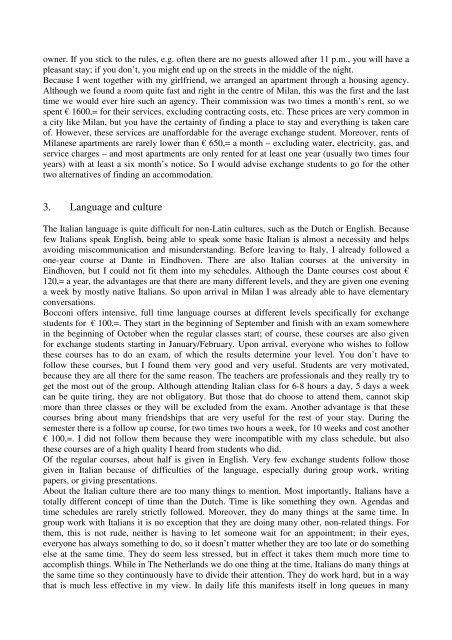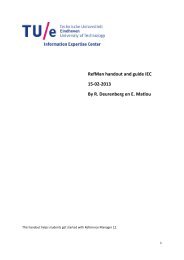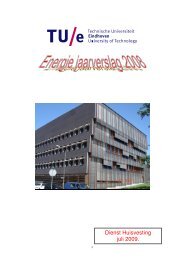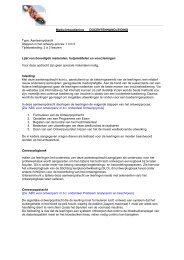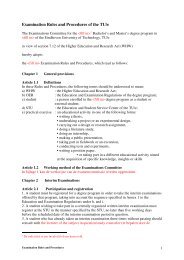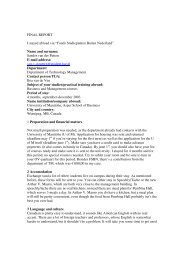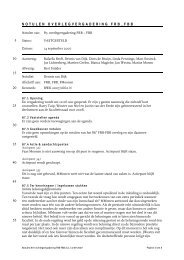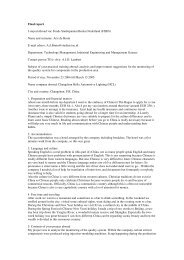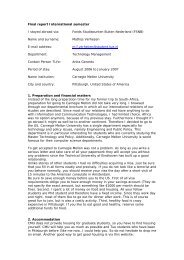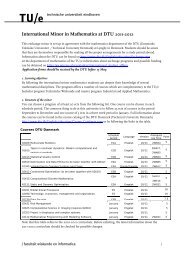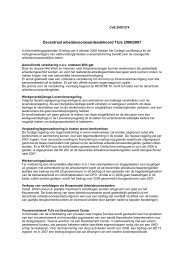Final report
Final report
Final report
You also want an ePaper? Increase the reach of your titles
YUMPU automatically turns print PDFs into web optimized ePapers that Google loves.
owner. If you stick to the rules, e.g. often there are no guests allowed after 11 p.m., you will have a<br />
pleasant stay; if you don’t, you might end up on the streets in the middle of the night.<br />
Because I went together with my girlfriend, we arranged an apartment through a housing agency.<br />
Although we found a room quite fast and right in the centre of Milan, this was the first and the last<br />
time we would ever hire such an agency. Their commission was two times a month’s rent, so we<br />
spent € 1600,= for their services, excluding contracting costs, etc. These prices are very common in<br />
a city like Milan, but you have the certainty of finding a place to stay and everything is taken care<br />
of. However, these services are unaffordable for the average exchange student. Moreover, rents of<br />
Milanese apartments are rarely lower than € 650,= a month – excluding water, electricity, gas, and<br />
service charges – and most apartments are only rented for at least one year (usually two times four<br />
years) with at least a six month’s notice. So I would advise exchange students to go for the other<br />
two alternatives of finding an accommodation.<br />
3. Language and culture<br />
The Italian language is quite difficult for non-Latin cultures, such as the Dutch or English. Because<br />
few Italians speak English, being able to speak some basic Italian is almost a necessity and helps<br />
avoiding miscommunication and misunderstanding. Before leaving to Italy, I already followed a<br />
one-year course at Dante in Eindhoven. There are also Italian courses at the university in<br />
Eindhoven, but I could not fit them into my schedules. Although the Dante courses cost about €<br />
120,= a year, the advantages are that there are many different levels, and they are given one evening<br />
a week by mostly native Italians. So upon arrival in Milan I was already able to have elementary<br />
conversations.<br />
Bocconi offers intensive, full time language courses at different levels specifically for exchange<br />
students for € 100,=. They start in the beginning of September and finish with an exam somewhere<br />
in the beginning of October when the regular classes start; of course, these courses are also given<br />
for exchange students starting in January/February. Upon arrival, everyone who wishes to follow<br />
these courses has to do an exam, of which the results determine your level. You don’t have to<br />
follow these courses, but I found them very good and very useful. Students are very motivated,<br />
because they are all there for the same reason. The teachers are professionals and they really try to<br />
get the most out of the group. Although attending Italian class for 6-8 hours a day, 5 days a week<br />
can be quite tiring, they are not obligatory. But those that do choose to attend them, cannot skip<br />
more than three classes or they will be excluded from the exam. Another advantage is that these<br />
courses bring about many friendships that are very useful for the rest of your stay. During the<br />
semester there is a follow up course, for two times two hours a week, for 10 weeks and cost another<br />
€ 100,=. I did not follow them because they were incompatible with my class schedule, but also<br />
these courses are of a high quality I heard from students who did.<br />
Of the regular courses, about half is given in English. Very few exchange students follow those<br />
given in Italian because of difficulties of the language, especially during group work, writing<br />
papers, or giving presentations.<br />
About the Italian culture there are too many things to mention. Most importantly, Italians have a<br />
totally different concept of time than the Dutch. Time is like something they own. Agendas and<br />
time schedules are rarely strictly followed. Moreover, they do many things at the same time. In<br />
group work with Italians it is no exception that they are doing many other, non-related things. For<br />
them, this is not rude, neither is having to let someone wait for an appointment; in their eyes,<br />
everyone has always something to do, so it doesn’t matter whether they are too late or do something<br />
else at the same time. They do seem less stressed, but in effect it takes them much more time to<br />
accomplish things. While in The Netherlands we do one thing at the time, Italians do many things at<br />
the same time so they continuously have to divide their attention. They do work hard, but in a way<br />
that is much less effective in my view. In daily life this manifests itself in long queues in many


